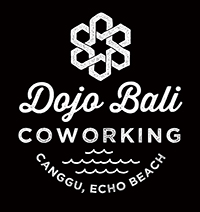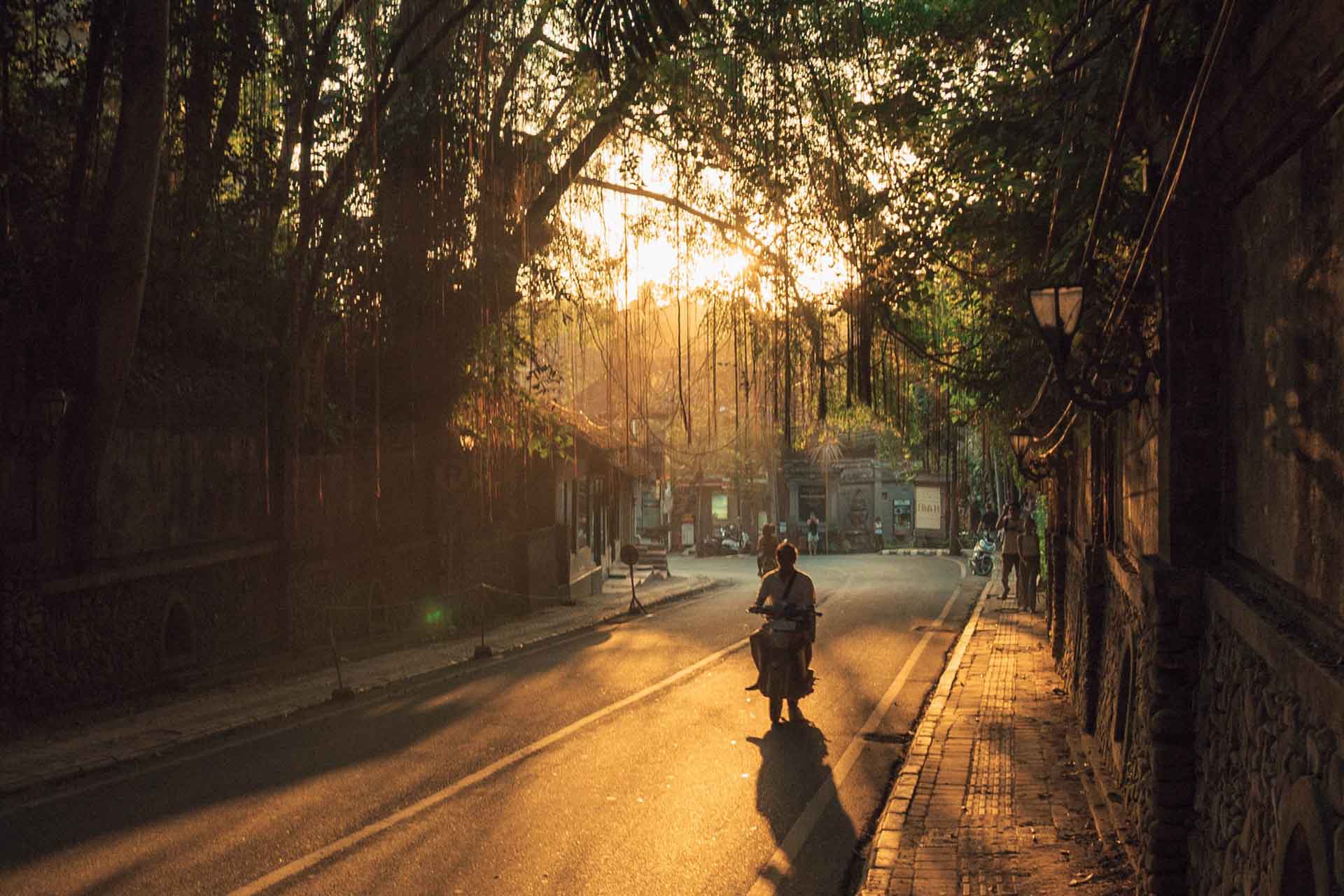Dojo Guide to Ubud: Ubud is located in the uplands of Bali, wedged between rice paddies, temples and steep ravines an hour’s drive from Canggu. It is considered the cultural heart of the island, and is a gorgeous artisan hub for the spiritual (and the spiritually narcissistic). Thanks to the popularity of Eat, Pray, Love, downtown is a little touristier than you may have romanticised, but all this means is that Ubud now boasts an endless stream of high quality restaurants, accommodation options and shops – its surrounding rainforest and rice terraces are as beautiful as ever.
Ridge Walks
Jalan Campuhan and Jalan Subak Sok Wayah, Ubud
Campuhan Ridge Walk has been highly popularised on social media, and is a relatively gorgeous two-or-three-kilometre stroll through a chunk of nature. Though the walk is not difficult (and is paved the whole way), prepare to get a solid sweat moustache by its end. Campuhan Ridge finishes in a built-up area lined with shops selling their artistic wares, and if you’re friendly and get chatting to some of the artists, they will be more than happy to arrange a class for you for cheap. Possibly even prettier than Campuhan Ridge is the walk along Jalan Subak Sok Wayah, which runs parallel to the ridge but is across the river. It is even further away from the buzz of the town and has an array of spacey astrologers and funky restaurants along its path, like Sari Organik, which serves up delightful fare overlooking a rice farm.
Yoga Barn
Jalan Raya Pengosekan, Ubud,
Yoga Barn is the granddaddy of all yoga places in Ubud. This colossal jewel of a place is set in luscious grounds in the centre of town and offers an ever-changing list of classes for yogis of every level, from meditation to acroyoga to the more bizarre ecstatic dance and sacred cacao ceremonies. Also available are a range of (overpriced) healing and Ayurveda treatments, teacher training courses and the occasional free community class or film. Admittedly, the place can get packed, but the five studios are more than capable of coping with large numbers of people. The onsite organic café is surprisingly affordable and has divine dishes to choose from, though make sure you wear your trendiest active wear or you’ll stick out like a sore thumb. Classes last an hour and a half and cost 130k each, though they get cheaper the more you buy.

Mt Batur Hike
If you like your mornings early, sweaty and with a view to boot, then use Ubud as your base to embark upon a sunrise hike up active volcano Mt Batur (which, unlike its feisty sister Agung, hasn’t tried to erupt for a good while). The walk is fairly easy to begin with, but gets more strenuous as you near the top, with the ascent taking around two hours. Practically every touter and hotel in town will be able to arrange the trek for you – expect to pay around 300k for a 2am transfer, guide and egg breakfast cooked in the volcano’s steam.
Clear Cafe
Jl. Hanoman No.8
Every aspect of this organic eatery will literally take your breath away, from its scrumptious smoothies slurped through bamboo straws to its marigold-covered surfaces. The menu is extensive, and though there are numerous vegetarian and vegan meals on offer, meat and egg lovers can still get their fix with a breakfast burrito or tasty serving of fish coated in crispy coconut flakes. Expect to pay about 50k for a meal, but so long as you order from the mains section, you won’t leave hungry.
Sacred Forest Monkey Sanctuary
Jalan Monkey Forest, Ubud
For a small fee, you can enter the lush monkey forest that grows around an array of stone temples built in the 14th century. In addition to being a vital component of Ubud in terms of the economic and spiritual value it brings to the town, the grounds are an important place for research and conservation programs, as they are home to 115 species of trees and about 600 monkeys. Conflict between the monkeys is rife, and if they have the slightest suspicion that you’re harbouring food (peanuts and bananas can be purchased inside), they will not hesitate to clamber all over you in search of it. Ensure your valuables are secured – cameras, wallets and even water bottles have all been stolen by the cheeky critters before.

Teganungan Waterfall
Kemenuh, Sukawati
Step into the land before time at the spectacular Air Tergun Tegenungan, a 25-minute scooter ride out of Ubud. Here, a spectacular waterfall cascades down mossy cliffs in a deep valley that is a magical green. Though it is overflowing with people from about 10am onwards, the sheer joy that radiates from everyone who dares get close to the powerful rush of water is infectious and only adds to the experience. Like most tourist attractions in Bali, expect to walk through 50 market stalls selling snacks and fairly useless Balinese paraphernalia on your way down, but you’ll be grateful they’re there on the way back up, as an ice-cream proves to be a welcome reward after the ascension of hundreds of stairs.
Satri Kopi Plantation
Jalan Raya Tampaksiring, Kintamani Basangambu
In normal circumstances, drinking something that has already passed through the gut of another animal may not seem too appealing. But in Bali, kopi luwak is considered one of the greatest delicacies. At Satri Kopi Plantation, which is a short drive from Uud, you can witness how the, er, coffee-making process occurs first hand courtesy of the cute furry mammals known as Asian palm civets. There is a selection of coffee on offer for you to try and probably a few-to-many souveniers. Also, if you’re unfamiliar with the region’s many fruit trees, a guided stroll around the pleasant in-house gardens will set you straight. If you end up chasing after this delicacy all over the island though, be sure to do your research first – kopi luwak practices can clock in pretty highly on the cruelty scale due to the way the animals are caged, fed unbalanced diets and denied their nocturnal body clocks.
The Green School
Jalan Raya Sibang Kaja, Banjar Saren, Abiansemal, Kabupaten Badung
The Green School has—as its name suggests—a unique and holistic approach to education, with its mission being to help every child become a mindful, critical thinker committed to contributing to their community. As such, high-level theoretical education is combined with hands-on learning, where students are taught to build, garden, use their bodies and create in manners that are sustainable. The semi off-the-grid campus near Ubud has an incredibly innovative design (think bamboo classrooms and self-composting toilets), and is perched on the Ayung River, so students can take a dip (in a life-jacket) when the weather is warm. The Green School caters to students from kindergarten age all the way through to year 12, and also offers boarding, but even if you’re not school age, the grounds are well worth a visit. For a fee, you can check out some permaculture on their neighbouring farm, suss the cool architecture, find out more about the school’s philosophies or learn about recycling.
Hubud
Jl. Monkey Forest No.88X
Co-working spaces are springing up all over Bali, and after Dojo of course, Hubud is one of the finest – and was also actually the first on the island. While you’re in Ubud, drop in to Hubud for a day of digital nomadism, cross-pollination and networking. The space boasts a fabulous community, runs events almost daily and has glorious architecture and design. A day pass will set you back $20USD.






